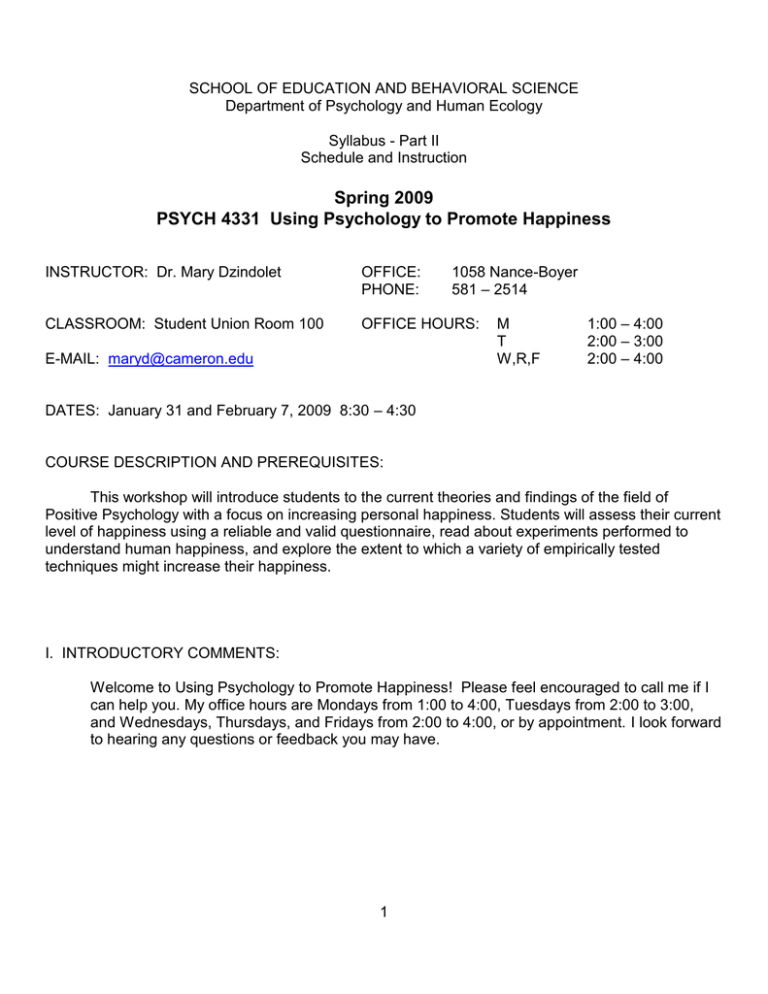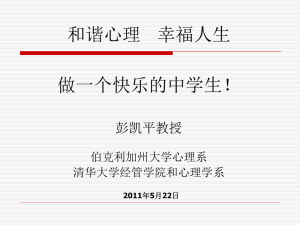SCHOOL OF EDUCATION AND BEHAVIORAL SCIENCE Syllabus - Part II
advertisement

SCHOOL OF EDUCATION AND BEHAVIORAL SCIENCE Department of Psychology and Human Ecology Syllabus - Part II Schedule and Instruction Spring 2009 PSYCH 4331 Using Psychology to Promote Happiness INSTRUCTOR: Dr. Mary Dzindolet OFFICE: PHONE: CLASSROOM: Student Union Room 100 OFFICE HOURS: E-MAIL: maryd@cameron.edu 1058 Nance-Boyer 581 – 2514 M T W,R,F 1:00 – 4:00 2:00 – 3:00 2:00 – 4:00 DATES: January 31 and February 7, 2009 8:30 – 4:30 COURSE DESCRIPTION AND PREREQUISITES: This workshop will introduce students to the current theories and findings of the field of Positive Psychology with a focus on increasing personal happiness. Students will assess their current level of happiness using a reliable and valid questionnaire, read about experiments performed to understand human happiness, and explore the extent to which a variety of empirically tested techniques might increase their happiness. I. INTRODUCTORY COMMENTS: Welcome to Using Psychology to Promote Happiness! Please feel encouraged to call me if I can help you. My office hours are Mondays from 1:00 to 4:00, Tuesdays from 2:00 to 3:00, and Wednesdays, Thursdays, and Fridays from 2:00 to 4:00, or by appointment. I look forward to hearing any questions or feedback you may have. 1 II. SPECIFIC LEARNING OBJECTIVES: After studying each segment of the course, the student should be able to demonstrate the ability to: A. Discuss the scientific method, and describe the characteristics of the random-assignment placebo-controlled experiment. Discuss why this experiment is important to the study of Positive Psychology. B. Provide an up-to-date summary of recent findings in the Positive Psychology literature. C. Calculate their subjective well-being score. D. Perform twelve empirically validated activities that improve subjective well-being. E. Determine which of the activities best match the student’s strengths and weaknesses. III. ACTIVITIES, REQUIREMENTS, ASSIGNMENTS: A. Various Instructional Methods 1. Lecture / Class discussion 2. Small group discussions 3. Individual and group activities B. Demonstrate attendance C. IV. EVALUATION/GRADING: Students enrolled for university credit will receive a satisfactory/unsatisfactory grade. V. ATTENDANCE/WITHDRAWAL POLICY: Cessation of attendance does not constitute an official withdrawal from the course. Failure to officially withdraw will result in a "non-attendance" failure. Consult the University Catalog for the proper procedure for withdrawal. VI. COURSE OUTLINE: Topic Chapter A. Group Definition B. Research Methods 1 2 2 Approximate Dates 1/13 1/20 C. Social Identity & Group Formation D. Group Structure & Cohesion 3&4 5&6 Review for Examination #1 Examination #1 1/27 2/3 2/10 2/17 E. Social Influence & Power 7&8 F. Group Performance 9 G. Group Decision Making 10 Summaries of 4 Empirical Research Articles H. Conflict & Negotiation 12 & 13 2/24 3/3 - 3/10 3/24 3/24 3/31 Review of Examination #2 Examination #2 4/7 4/14 Rough Draft of Introduction Section Rough Draft of Method Section 4/21 4/21 I. Leadership & Collective Behavior Oral Presentations of Proposals Final Draft of Written Proposal 11 & 16 4/21 4/28 5/5 COMPREHENSIVE Final Exam 5/5 It is the policy of Cameron University to accommodate students with disabilities, pursuant to federal and state law. Students with disabilities who need classroom accommodations must make their requests by contacting the Office of Student Development at (580) 581-2209, North Shepler Room 314. 3





